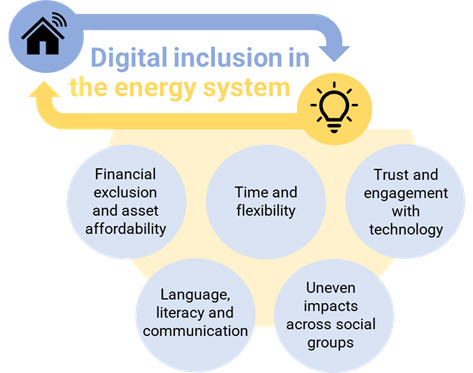Digital inclusion in the energy system: How do we ensure the opportunities and benefits of digitalisation can be accessed by everyone?
Digital technologies play an increasingly important role in how households engage with the energy system. They promise significant benefits, facilitating greater efficiency and flexibility, and potentially better outcomes for consumers (e.g., cheaper bills). However, this digitalisation also risks deepening inequalities in the ability of households to access sufficient energy to ensure health and wellbeing, especially for people without the tools and skills to engage with new digital services and technologies.
About the research
Based on our new research, digital inclusion – the extent to which people can take part (or not) in increasingly digitalised systems – should be an integral pillar of energy system digitalisation. To ensure the benefits of digitalisation are accessible to all, digital inclusion should be centrally embedded in energy policy and given equal weight alongside technical, economic, and regulatory aspects of the energy transition. Our research reviews links between fuel poverty, digital exclusion, and energy system digitalisation, identifying key barriers to digital inclusion in the energy system.

Policy recommendations
Digital inclusion should be an integral part of energy policy, and vice versa
- Regulators, governments, and the energy industry should consider adopting a common definition of digital inclusion in the energy system.
- Government and regulators should assess and track the scale of the digital exclusion premium in regulated energy markets, to understand the depth of the issue for energy consumers.
- Challenges of digital engagement with the energy market should form a central part of digital inclusion policies, including local authority strategies.
Support for digitally excluded households
- Government should consider how trusted, locally embedded community organisations can be funded and enabled to deliver practical advice and digital inclusion initiatives.
- Marginalised groups such as refugees, older people, and people with a disability must be a priority.
Establishing best practice
- Best practice should be established via funded pilot studies implemented by local authorities and community organisations.
- Schemes might build on energy advice or digital champion initiatives, but also innovate further.
Digitally excluded groups should input into the design of new services and systems
- Smart energy technologies and services need to be designed for, and with, digitally excluded consumers through meaningful and continual consultation by a range of industry actors.
Key findings
We identify several barriers to digital inclusion in the energy system that are important for to consider:
Financial exclusion and asset affordability
New smart digital technologies are often considered a luxury by low-income households as they prioritise other essentials, meaning they miss out on the benefits of digitalisation (e.g., ability to manage their budgets or switch suppliers). Digitalisation also provides new ways for companies to recover debt, and households can perceive new technologies as intrusive.
Time and flexibility
Digitalised energy systems encourage flexible use of cheaper electricity at times of high renewable generation or low network constraint, providing price signals to households using digital technologies. Low-income households are often less likely to be able to shift electricity use and save on bills. The ability to respond to pricing signals also depends on digital skills and trust in technologies.
Trust and engagement with technology
Digitally excluded customers are less likely to trust that digital technologies will work for them and won’t operate nefariously. Increasingly, digitalised energy infrastructures also generate new household level data that influences real-time pricing. Consumers have low levels of trust in how energy companies will use, store, and share their information.
Language, literacy, and communication
Use of overly technical vocabulary in digital tools and bills is a barrier for those whose first language is not English, or who have limited literacy and numeracy skills. Increasingly companies engage with consumers digitally (e.g., SMS notifications, online platforms), disadvantaging digitally excluded customers who rely on traditional forms of communication. Low digital skills impact on engagement with other aspects of digitalisation (e.g., navigating switching sites).
Uneven impacts across social groups
Certain segments of society are more likely to experience digital exclusion and be vulnerable to fuel poverty, including older persons, people with a disability and those from migrant and refugee communities. These identities may also intersect and exacerbate vulnerabilities.
Further information
Find our article published in People, Place and Policy:
Chambers J, Robinson C and Scott M, (2022). Digitalisation without detriment: A research agenda for digital inclusion in the future energy system. People, Place and Policy. https://doi.org/10.3351/ppp.2022.5254227477
A presentation summary is also available here.
Sareen S. (2021). Digitalisation and social inclusion in multi-scalar smart energy transitions. Energy Research & Social Science. https://doi.org/10.1016/j.erss.2021.102251
Good Things Foundation (2021) Digital Divide. https://www.goodthingsfoundation.org/the-digital-divide/
Funding information
This research was funded by the EPSRC Supergen Energy Networks Hub. The research is also supported by a UKRI Future Leaders Fellowship grant (MR/V021672/1).
Authors
*The views/opinions of this author are their own and exist separately to those of Lewisham Borough Council.
